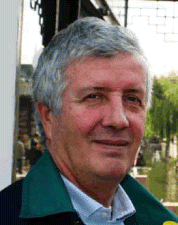Claudio Cherubini
Claudio Cherubini, professor in Engineering Geology at the Polytechnic of Bari, passed away last August after a 22 month fight against brain cancer.
He was an Italian pioneer of reliability studies applied to mechanical characterisation of geomaterials since the late 1970s. He strongly supported the use of statistical tools for the purpose of improving the quality of geotechnical design. He promoted this through his technical papers (more than 250), lectures and professional activity.
Throughout his career as Associate Professor in Geotechnical Engineering from 1983 to 2000, and as a professor in Engineering Geology later on, he never lost his leading idea of investigating the inherent variability of soil properties and the uncertainties associated with the models used in geotechnical design, due to their significant influence on the expected performance of geotechnical structures (such as foundations and retaining walls). Moreover, he tried to investigate the role of inherent variability on the stability of natural soil slope. To this end, he devoted much of his scientific efforts toward the application of statistical techniques for deriving the ‘characteristic values’ of geotechnical design variables. This concept has been introduced in the Eurocodes.
His natural curiosity and extensive interests made him a passionate researcher and a good teacher of several subjects such as soil mechanics, foundation design, applied hydrogeology, rock mechanics, geomorphology and slope stability, rock mechanics and rock mass improvement. He also disseminated his research findings to the industry by acting as a geotechnical or geologist consultant. His interdisciplinary perspective enabled him to manage the complexity of natural phenomena (in particular soil and rock slope stability, rock quarry stability and subsidence phenomenon due to karstic holes) from several different viewpoints and to combine techniques that would model system behaviour most realistically.
In addition, he devoted significant efforts to promoting the quality of teaching and research at the University where he has spent his entire career: Polytechnic of Bari. He contributed in different academic roles within the university such as President of the Board for teaching activity, Member in Chief for the ‘Environmental and Territorial Safety and Control’ within the scientific board of the InterPolytechnical Doctorate School and Coordinator for Apulia Region of the national laboratory network for research on the Environmental Sciences. He brought a valuable international perspective to his activities in the Polytechnic of Bari through his active educational engagement with colleagues from several European engineering schools, through international research projects, by participation in international conferences and by sitting in numerous technical committees.
He believed that the role of an engineering geologist is a multidisciplinary one, needing expertise in geotechnics, hydraulics, applied geophysics and geology. He advocated that a university education should equip engineering geology students with a multidisciplinary expertise to face natural risks arising from climate changes and heavy exploitation of natural resources in Italy as well as worldwide. Most of his teaching and tutoring activity was shaped around his belief that the main objective for a good researcher is not to provide ultimate answer to complex problems but to be able to ask very good questions and to provide sensible interpretations of complex phenomena at different probability of occurrence.
Inspired by his favourite readings, for example the Philosophy of Science and especially Popper's Thought, he advocated that ‘doubt’ should fuel discoveries and be used as a foundation to offer the best possible solution based on the available knowledge of the investigated physical phenomenon. In his own words: ‘The Scientist doesn't have the tools to seek the truth. Natural phenomena can only be captured by means of limited models that must be drawn from the contribution of sundry disciplines’.
With the support of many colleagues who shared his belief in multidisciplinary research, he recently promoted ‘dialogue among sciences’ by organising three successful workshops called the ‘Winter School-Dialogue and Knowledge’ in February–March 2008, 2009 and 2010. Researchers from different branches of sciences and the humanities come together with the aim of developing a more comprehensive model of the theme under study from disparate perspectives.
Even throughout his prolonged illness, he remained very active and committed to his work and continued to put forward new ideas, never allowing his illness to affect his cheerful and infectious personality that has made him a distinguished scholar, a recognised engineer and a devoted teacher who has commanded respect and love from many friends worldwide.
His friends, students and colleagues will miss him very much.
Giovanna Vessia
Department of Engineering and Geology University of “G. d'Annunzio” of Chieti-Pescara